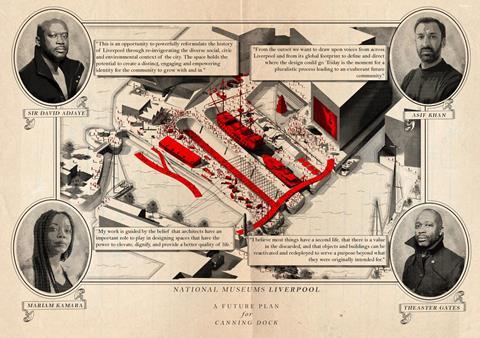Scheme will see historic Canning Dock reimagined to tell the site’s controversial history

A team led by David Adjaye and Asif Khan has been announced as the winner of a competition to design a transformation of Liverpool’s historic Canning Dock.
The project will aim to tell the story of the controversial site’s links with the Atlantic slave trade with a new public realm and public art strategy.
The winning team, which also includes Nigerian architect Mariam Kamara and US installation artist Theaster Gates, pipped rival teams led by DSDHA, Shedkm, Arup and OMMX to win the prestigious urban regeneration job.
The competition shortlist also featured a team led by BIG which included Adjaye’s music producer and sound artist brother, Peter Adjaye.
The six teams were chosen by a seven-member judging panel which included AHMM founder Paul Monaghan and landscape architect Annie Coombs.
Canning dock, which is at the centre of a cluster of museums on Liverpool’s listed waterfront, was originally opened in 1737 and was a key port serving ships transporting slaves across the Atlantic in the 18th and early 19th centuries.
National Museums Liverpool (NML), which is leading the project, is overseeing a 10-year masterplan to reimagine the waterfront.
It said the scheme will look for ways to bring the history of the slave trade into the public realm through “compelling and sensitive” designs which engage and represent liverpool’s black communities.
Adjaye said the work will be an opportunity to “powerfully reformulate the history of Liverpool through re-invigorating the diverse social, civic and environmental context of the city”.
He added that recognising the history of the site in a new public realm strategy “holds the potential to create a distinct, engaging, and empowering identity for the community to grow with and in.”
Asif Khan said he and his fellow competition winners had formed a “different kind of design team” which aimed to “steward a significantly meaningful” project into being.
He said: “History is like the ocean, with all its depths and treachery.
“Looking out from the shore, those waters feel like they belong to us, and yet the sea looks so different from where you stand in the world.
“History can wash things away one day and brings them back like ghost ships the next. Reconciling with history is how we grow as individuals, as communities, and – we believe – is what makes life and cities beautiful.”
Mariam Kamara said the project would be an opportunity to “exhume memories”, allowing visitors to explore and engage with the dock’s history while “firmly facing towards the future”.
“The Canning Dock transformation is a chance to explore the power of architecture as a storytelling tool to bridge the gaps in knowledge that exist about the history of Liverpool as well as this significant site.
“The NML Waterfront Transformation is an opportunity to pull on the threads that make up the history of the transatlantic slave trade - from Africa, across the Atlantic to the US and back to Liverpool.”
Theaster Gates said the project “will not be an easy journey” but that the team would “take the task with great humility and seriousness.”
He added: “Commemoration and memorial making are some of the most important acts a nation can be involved in - especially commemoration around racial complexity and social ill.
“Canning Dock represents one of the most important racialised sites in the UK and it gives me tremendous honour to work with this team to realise the complexity of the site.
“We hope that by using the tools of monument making and memorialising and commemoration, we will be able to do what many have not been able to do, which is to give emotional heft to the truth of slavery in the UK historically and the possibility for a site of re-emotionalising, healing, and processing those complexities.”
The project will include new bridges and pedestrian routes connecting parts of the complex site, which links Mann Island with the adjacent Royal Albert Dock.
Two dry docks next to the museum buildings will be reimagined as an “educational and cultural experience”, according to NML, while the area’s International Slavery Museum will be enhanced with a “dramatic” new front door.
NML said the scheme said the “timely” transformation would not just be for the benefit of Liverpool, but for the whole of the UK.
The competition has been funded by Liverpool city region combined authority, with NML currently in the process of securing funds to realise the project.
Liverpool city council has lodged a bid for the government’s levelling up fund, with the outcome expected to be announced later this autumn.
>> Also read: Four presidents and a rock star congratulate David Adjaye as he receives 2021 Royal Gold Medal
The shortlist
Arup with KCAP, NOOMA Studio, Carve, K2, f.r.a, Rianna Jade Parker, Writing on the Wall, PLACED, Rob Burns, Andrea Nixon, Ray Costello, Abigail Bernard, Anthony Walker Foundation
Asif Khan Architects with Sir David Adjaye, Theaster Gates, Miriam Kamara, Plan A Consulting, Prior + Partners, The Place Bureau, Hara Design Institute, AKTII, ARUP, Donald Insall Associates
BIG with JA Projects; Peter Adjaye; CAVA Institute; Beyond the Box; Poor Collective; Futurecity; LDA Design; AKT II; Hilson Moran; Gardiner & Theobald
DSDHA with Benedetti Architects; Spiers Major; Stantec; Resolve; Neal Shasore; Turley; Hood Design Studio (USA); Gardiner & Theobald
OMMX with Resolve Collective; Create; Lily Mellor; JCLA Landscape Architecture; Kellenberger-White; Jane Wentworth Associates; Arup; Focus Consultants
Shedkm with Placed; Kaizen; Place & Context; Grant Associates; Expedition
View the shortlisted entries
















1 Readers' comment